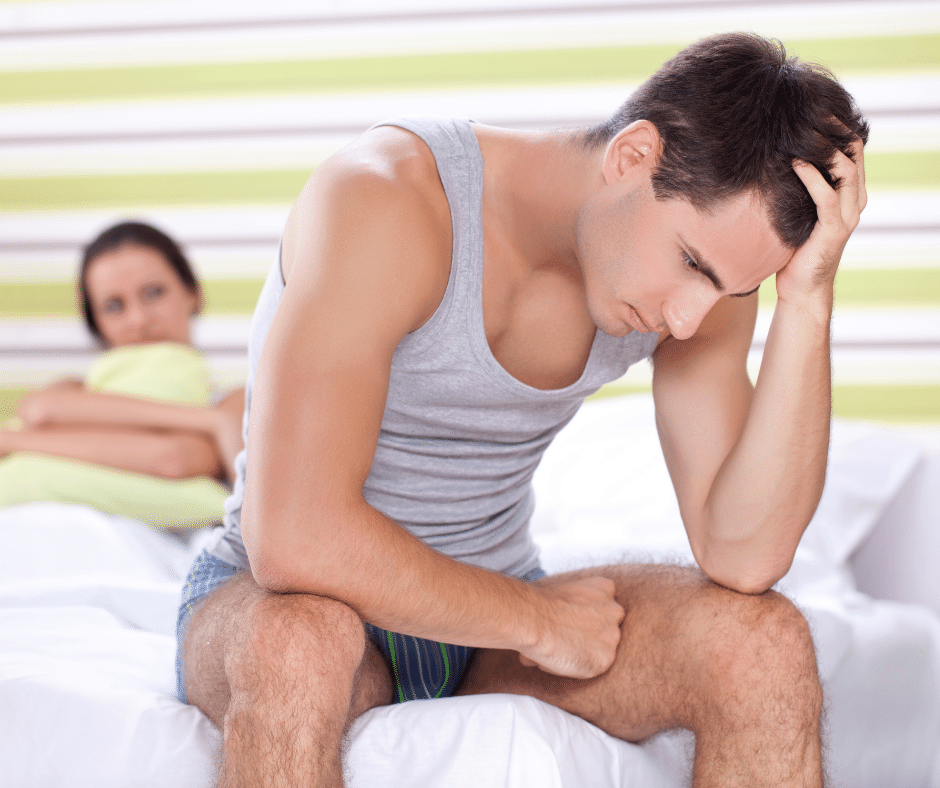
Erectile dysfunction (ED) is often thought of as a medical condition that comes along with age. However, ED is affecting more young guys than ever before.
In the majority of cases, ED is the result of an underlying medical condition, so are younger guys getting less healthy or is their ED psychological?
Psychological ED
Psychological ED is a real thing, and it’s much more common than you think. In fact, research shows that up to 20% of ED cases are psychological in nature. The true number may be even higher as people neglect to tell researchers about their embarrassing issues.
Erectile dysfunction is classed as psychological ED if your erectile issues are caused by psychological factors. Stress, depression, guilt, low body image, relationship issues, anxiety or performance anxiety can all lead to ED.
On the other hand, physical ED is usually the result of an underlying medical condition that affects blood flow to the penis. Including heart disease, diabetes or other vascular issues.
Psychological ED is a problem that can happen to both younger and older men, regardless of their physical health or sexual experience.
Quite often, it co-exists with physical ED as the stress and anxiety of sexual performance increases.
How to tell if your ED is psychological?
Before coming to a conclusion your ED is psychological, it’s essential to rule out any underlying medical conditions. Unfortunately, ED is often an early warning sign of heart disease, so it’s crucial to check for risk factors.
The first step is to have a consultation with your doctor. Your doctor will ask you some questions, do a physical examination, run some tests and review your medical history.
If no physical signs of ED are found, there are a couple of key questions that could indicate your ED is psychological:
- Do you get nighttime or morning erections?
Often referred to as “morning wood”, it’s common for men to get erections during the night and in the morning while they’re asleep.
The parasympathetic nervous system is responsible for sexual arousal. It is active while your body rests and repairs itself, so erections can happen several times during the night when you’re asleep. However, you may not notice them every night as you generally only notice them if you have an erection when you wake up.
So what’s the significance of the morning erection? The morning erection tells us that the physical mechanisms required to get an erection are intact. Therefore if you’re experiencing ED with your partner, there may be a psychological link.
- Are you able to get an erection while alone?
If getting an erection while masturbating is not a problem, it also holds true that your body is physically capable of getting an erection. Something else is stopping your erection from happening when you’re with your partner.
Causes of psychological ED
Psychological ED occurs when the brain takes control of your body and prevents it from doing what it’s naturally meant to do.
Here are some of the common psychological causes that can interrupt the signal between your brain and your body:
Performance Anxiety
Sexual performance anxiety is the debilitating fear about being able to satisfy your partner. Performance anxiety might be worrying about your penis size, ejaculatory control, erectile function or ability to give your partner pleasure.
Ironically the more you worry about these things, the more likely you are to experience ED.
When you’re stressed or anxious, your brain releases hormones adrenaline and cortisol, known as the “fight or flight” response and prepares the body for danger. As a result, your muscles tense up, alertness increases, and your heart rate increases. Your body is ready for action, but not the kind of action you want.
Performance anxiety may be the original cause for your ED, or it could result from a bad prior sexual experience. Sometimes performance anxiety can turn into a vicious cycle where you fail to achieve an erection once and then become so stressed about it next time that you fail again.
Stress and Anxiety
Everybody gets stressed or anxious at various times in their lives, although some of us experience it a lot more than others. It may be work-related stress, stress about money or some other challenging life event.
Anxiety is the body’s natural response to stress and is usually a feeling of apprehension about what’s to come. You may get butterflies in your stomach when responding to stress, or you may suffer an all-consuming paralysis effect where you just can’t move forward with the task that needs to be done. The latter tends to be the case if it results in ED
Stress and anxiety affect the nervous system and hormones (cortisol and adrenaline), essentially removing the body’s ability to get sexually aroused.
A 2015 study looking at men with psychological ED or premature ejaculation found that 23.4% of men in the study had an anxiety disorder before the onset of sexual dysfunction.
Depression
Depression is a mental health problem that can affect how you feel and behave for weeks or months at a time.
When you’re depressed, your low mood lasts, affecting your sleep, relationships, job, and of course, your sex life.
Common signs of depression include:
- Feeling low, sad or depressed.
- Loss of interest and pleasure in usual activities.
- Irritable mood.
- Change in sleeping patterns.
- Change in appetite.
- Decreased energy, tiredness and fatigue.
- Feeling of worthlessness or guilt.
- Thoughts of hopelessness or death.
- Difficulty thinking clearly.
Depression is linked to changes in your brain chemistry and nervous system. Some of these areas also affect your sex drive and ability to get an erection. A 1998 study showed a clear link between ED and depression in middle-aged men.
Relationship Issues
It’s no secret that relationships are complex, and it takes ongoing work to ensure they thrive.
If you’re going through a rocky stage in your relationship, it’s certainly not conducive to intimacy and sex from either side.
Relationship issues may interfere with your libido (sex drive) as well as your ability to get an erection.
Alternatively, it may be your ED that is putting strain on the relationship. It can be a tough conversation to have with your partner, but if left unspoken ED can put further strain on the relationship.
Porn
Before the introduction of the internet and free porn sites, ED in sexually active men under 40 was relatively low. A 2016 study indicated that porn may be contributing to the sharp rise in ED and low sexual desire in men.
When used as a constant aid to masturbation, you may find you can only get an erection when watching porn. The brain becomes conditioned and “needs” porn for sexual arousal to occur.
Watching porn can also lead to unrealistic expectations of a “normal” sexual encounter, resulting in performance anxiety.
Guilt
Guilt can manifest itself in various ways that can affect your ability to get an erection. The guilt of being unable to please your partner, guilt of prior or existing affairs, the guilt of being married when having an affair with a mistress. This can contribute to the ongoing cycle of ED, much like performance anxiety.
Low Self Esteem
Low self-esteem is often accompanied by other factors such as anxiety and depression. Low self-esteem can lead to ED and vice versa. A 2004 study analysed the impact of ED on men and their relationships. It showed that ED caused severe distress to all men that experienced it, with marked effects on their self-esteem and relationships.
Treatment options for psychological ED
Psychological ED is complex, but don’t be disheartened. It can be successfully treated.
Medication
Although medication doesn’t treat the underlying cause of psychological ED, oral prescription treatments are considered an effective option. It can be beneficial to treat short term sexual anxiety until you are comfortable with your partner.
Therapy
ED is a difficult subject for most guys to talk about, but speaking with a therapist in a confidential “safe” space can be an effective way of addressing the root cause of your ED problem.
A sex therapist will work with you to identify and change unhealthy patterns of thought that may contribute to your ED.
Chat with your Partner
Sometimes it can be as simple as having an open conversation with your partner. Admitting your concern can significantly reduce stress and anxiety and pave the way to increased confidence.
Other Options
If you’re not ready to actively seek treatment or talk to someone about it, there are a few techniques you can try on your own:
- Meditation – has long been proven to give you a sense of calm, balance and emotional well being. It can also familiarise you with anxiety-inducing thoughts and help you differentiate between irrational and rational thoughts. A guided meditation app such as Headspace may be helpful for you.
- Guided Imagery – This is similar to guided meditation, where you close your eyes and listen to a script that describes the positive scenario you wish for. Guided imagery enables the body to tap into the unconscious and make real changes. It’s possible to purchase pre-recorded scripts specifically written and recorded for erectile dysfunction.
- Rhythmic breathing – Controlling your breathing and paying attention to your breath allows your body to relax naturally. Inhale and exhale slowly, counting to five as you inhale and counting to five as you exhale.
It’s fair to say that men are known for bottling things up when it comes to their feelings and their health. If left untreated, psychological ED can significantly impact your life and lead to a vicious cycle of stress and anxiety. It can also negatively impact personal relationships.
Don’t ignore signs of psychological ED. Talk to your partner, talk to a therapist, talk to a doctor.

